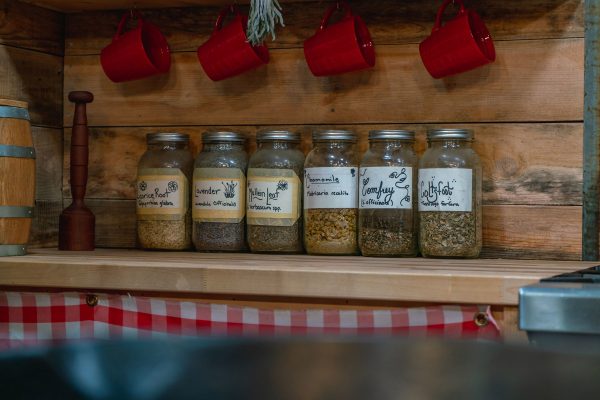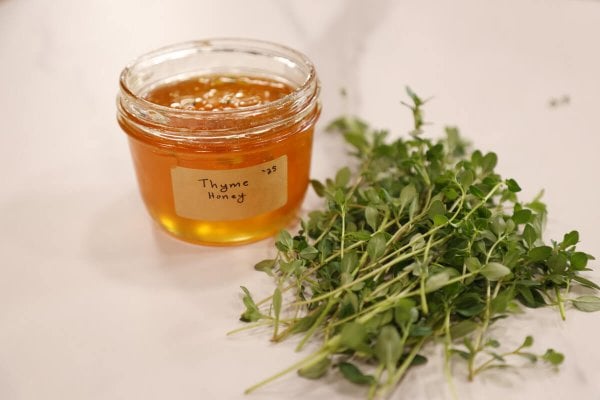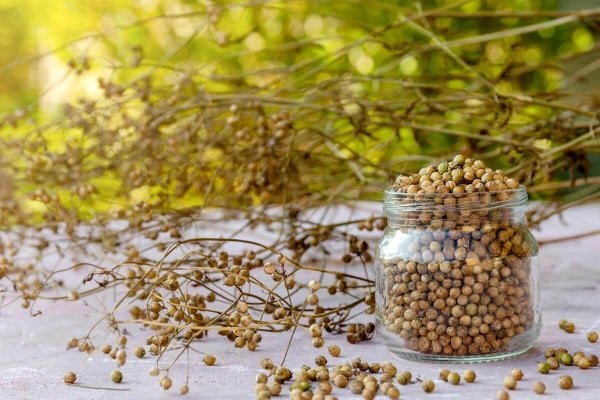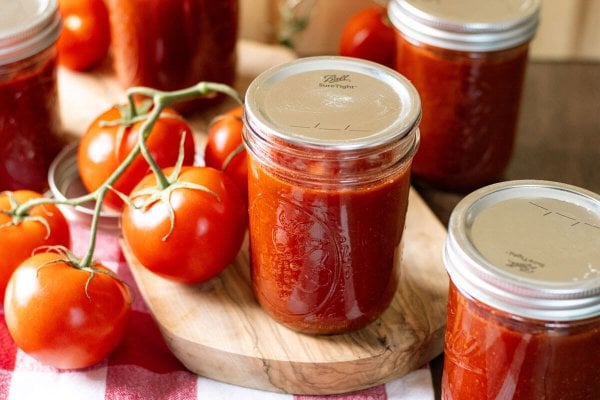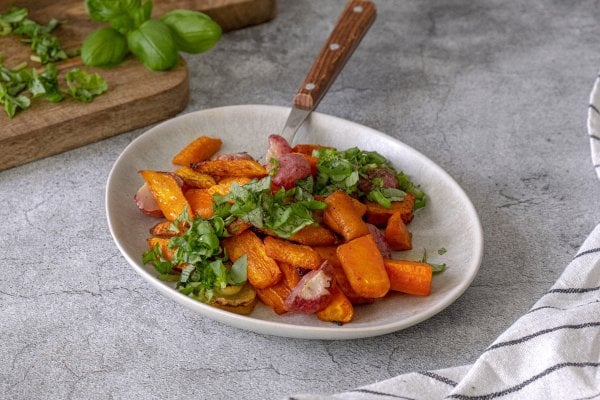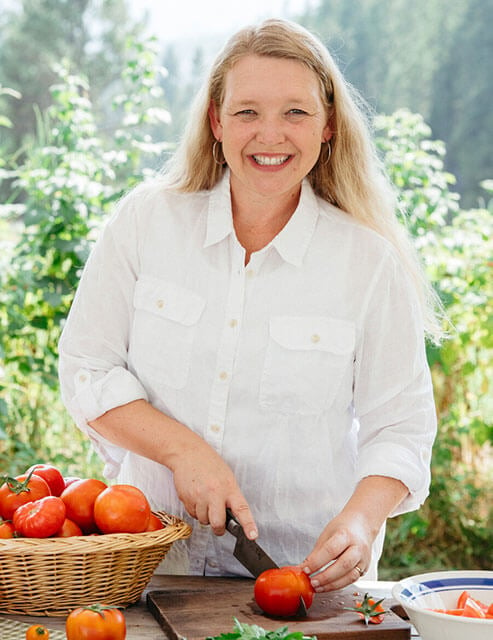Knowing how to identify poultry diseases, their cause, symptoms and treatment can prevent stress for you and your chickens, empowering you to enjoy the self-sufficient life of homesteading.
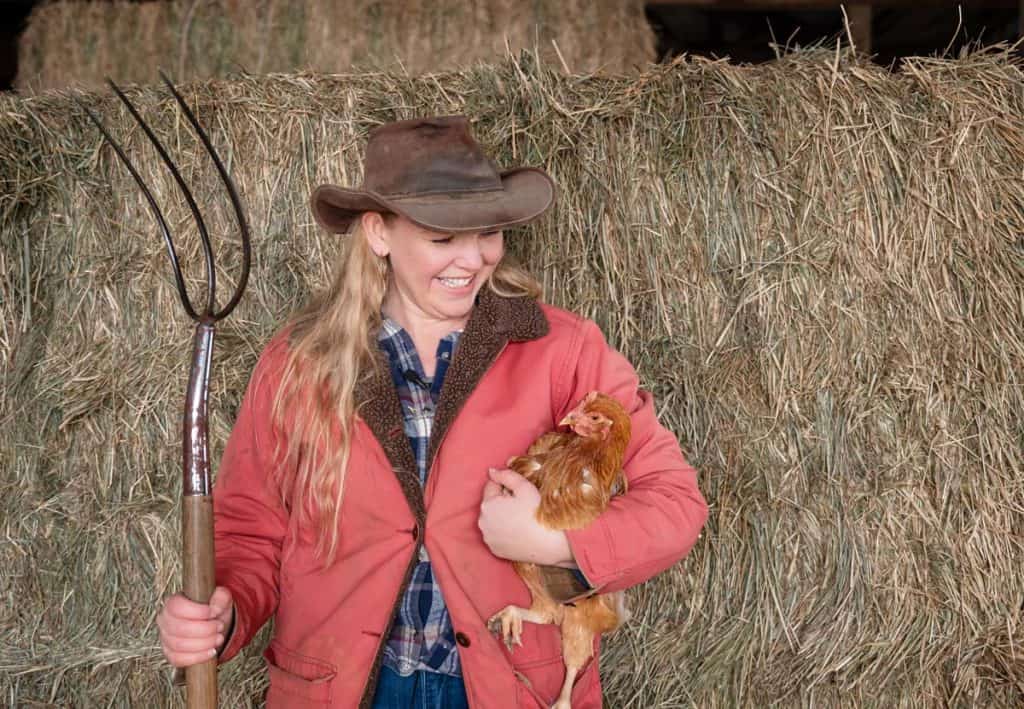
There’s nothing worse than walking out to the chicken coop and seeing one of your chickens lying on the ground. Knowing exactly what to do isn’t always easy, even when we’ve read all the books on chicken health.
There are so many things we can do not only to help prevent common chicken diseases, but did you know there are also many herbal remedies we can be confident in using to help our chickens in need?
Chickens are curious birds with particular traits and personalities. When they show signs of illness, we want to act quickly to return them to good health. I’m so excited for Heather Levin to join me on the Pantry Chat to discuss herbal remedies for common chicken ailments.
It’s important to note that I am not an accredited veterinarian. This post is not intended to diagnose or treat but is for informational purposes only. Please contact your animal care professional before introducing new herbal and natural remedies for your animals.
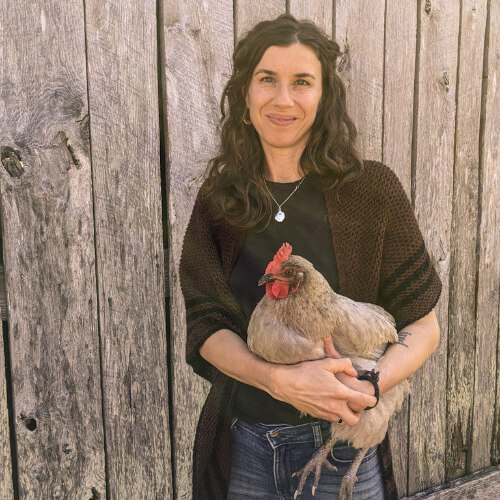
Table of Contents
ToggleAbout Heather Levin
Heather is a good friend of mine and has been writing for the Homestead Kitchen magazine. She and her family live on a 10-acre homestead in rural Tennessee, where she raises way too many chickens, keeps bees, gardens, and homeschools her two boys. She also loves canning and preserving the food and fruits they grow each year.
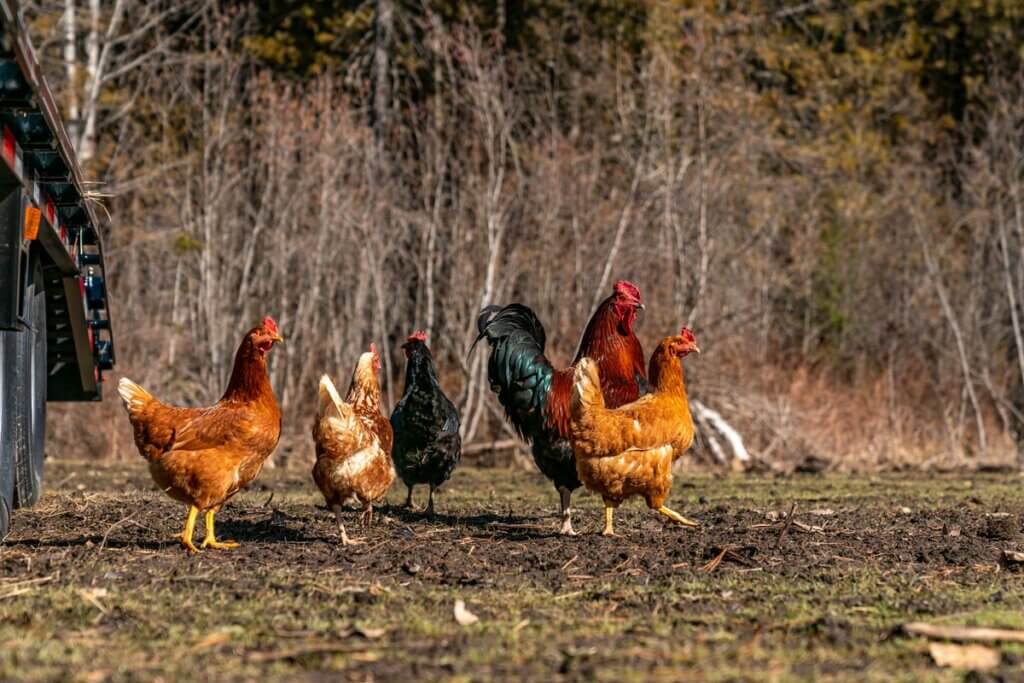
Chickens on the Homestead
We have been raising chickens for over 15 years and have learned the best ways to keep them healthy and productive. It has been said that “prevention is the best medicine,” and we have found that truth to be evident in most things.
Raising chickens on our homestead is a self-sufficient way to provide food for our family. Raising backyard egg-laying chickens and raising meat chickens is self-sustainable, and we enjoy the process from raising chicks to preserving eggs or getting the meat ready for the freezer.
Since the fall of mankind, diseases have been part of our world. Animals, plants, humans, no living thing or being is exempt.
Learning how to prevent illness, knowing what to look for and how to apply the knowledge learned is wisdom, and healing animals with natural remedies is the preferred way when possible.
The deep litter method and utilizing our chickens to restore the land are some ways we keep our chickens healthy. These methods create garden compost using our chicken tractor basics, bringing the permaculture cycle full circle.
Once we diagnose the disease in our chickens, we help heal them through various means. Fermented chicken feed, for example, is a simple homemade remedy that can enrich their food supply. (Source) Depending on the ailment, you may need more complex treatments.
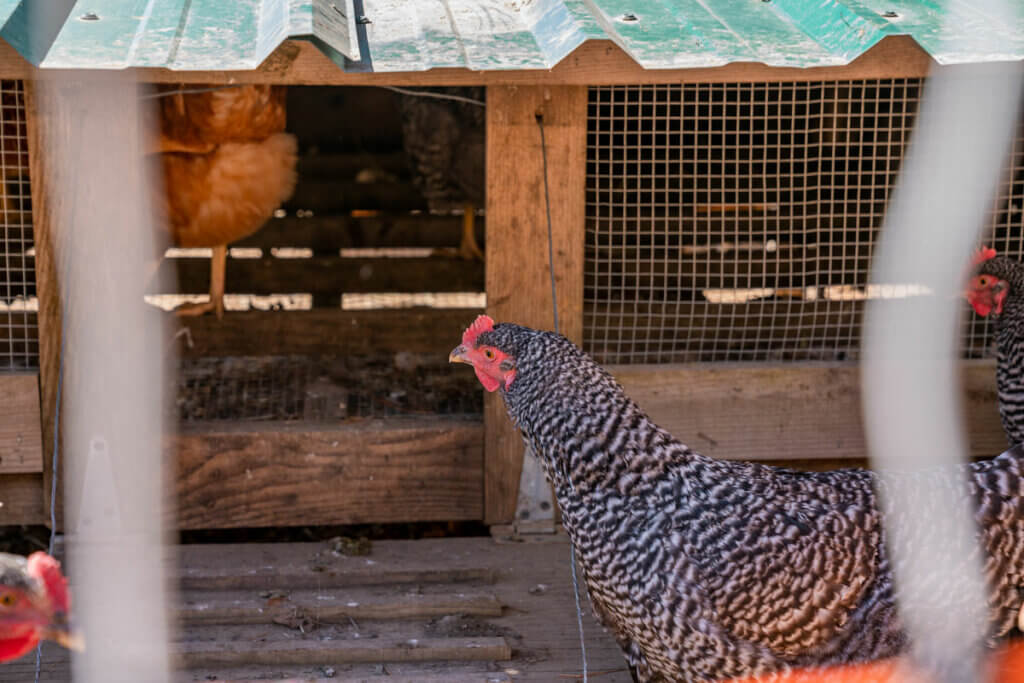
A Word on Prevention
“An ounce of prevention is worth a pound of cure.” Benjamin Franklin was onto something here. It’s so easy to reach for medicinal herbs when one of our children is sick, but we must keep this same principle in mind with our livestock.
If we use preventative methods to keep our homestead food sources healthy, we will also be healthier. Procrastination is the opposite of that wisdom, and it creates havoc when we don’t tend to the needs of our animals and plant life at the first signs of disease.
Stay in tune with your flock, visit them often and pay attention to their behaviors. You can often catch symptoms early and treat them preventatively with the herbal remedies listed below, potentially saving your entire flock.
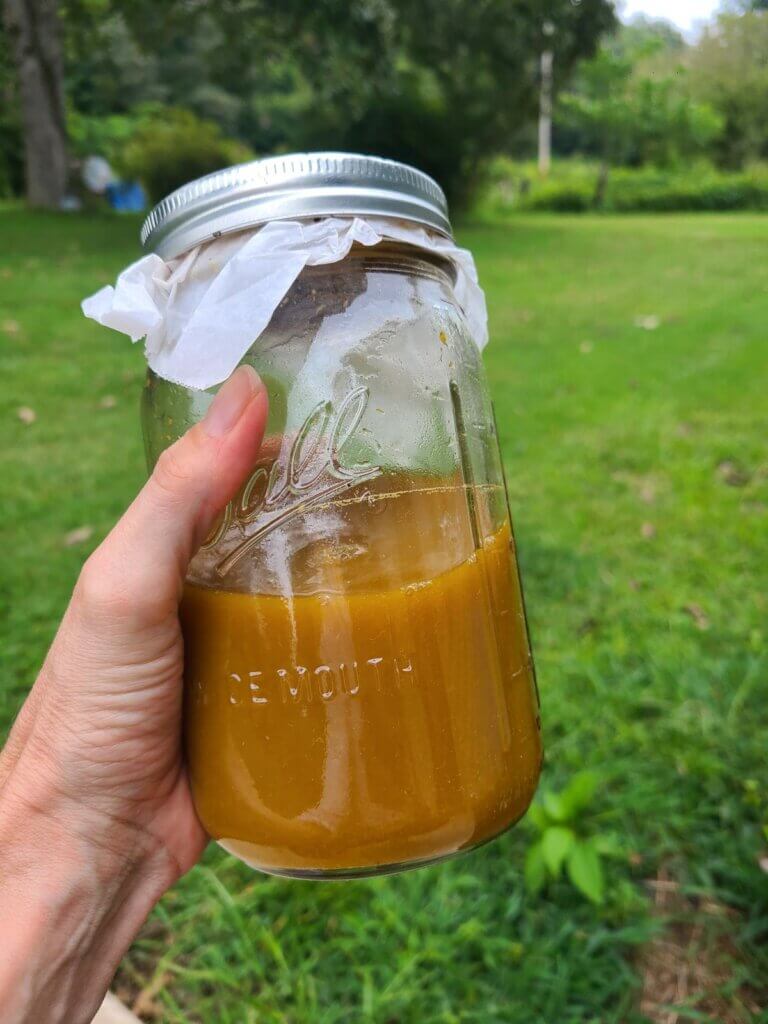
What to Do First?
I asked Heather what she does if she suspects an ill chicken. She gave a very detailed and specific protocol that she follows:
- Isolate the chicken into a “sick bay” in her laundry room.
- Check to see if she’s egg-bound. To do this, put a glove on your hand, lube it up with olive oil or coconut oil and gently insert your fingers into her vent a couple of inches to see if you feel an egg.
- Look for other symptoms (sneezing, is she eating, etc.).
- If the symptoms aren’t obvious, she’ll continue to monitor and start her on a preventative concoction of garlic and oregano oil in her water. (Heather always gives her chickens garlic in their water and fresh or dried oregano in their feed, but when a chicken is ill, that’s when she’ll do oregano oil in their water.)
- While tending to the sick chicken, Heather also increases her preventative measures for her flock.
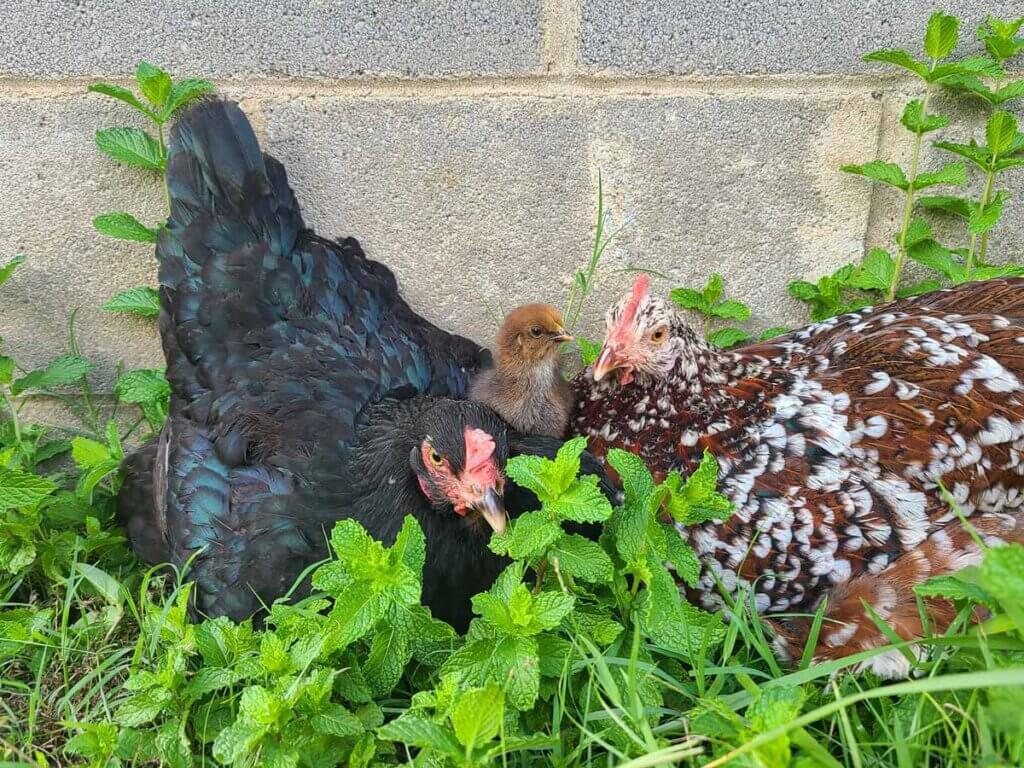
There are several diseases that poultry can get on the homestead. I will cover what we found are the most common and how to prevent and, if necessary, treat them effectively.
Parasitic Diseases
Lice, fleas, ticks and the red mite (dermanyssus gallinae) are parasites that can infect your chickens. Bird-to-bird transmission of parasites infects chickens. Under-maintained chicken coops create chicken litter that needs more organic matter and can transmit parasites to chickens.
Symptoms
- Signs of damage to their feathers (bald spots), irritated/scabbed skin, and even parasites in their feces will be evident.
- They won’t look vibrant and healthy; instead, they will look frazzled and tired.
- Check their backside for a dirty vent (it may look like dirt is caked around their vent).
- Coccidiosis is a common parasite that disturbs the gut lining of chickens. Common symptoms are runny, watery, or bloody droppings, ruffled feathers, and weight loss.
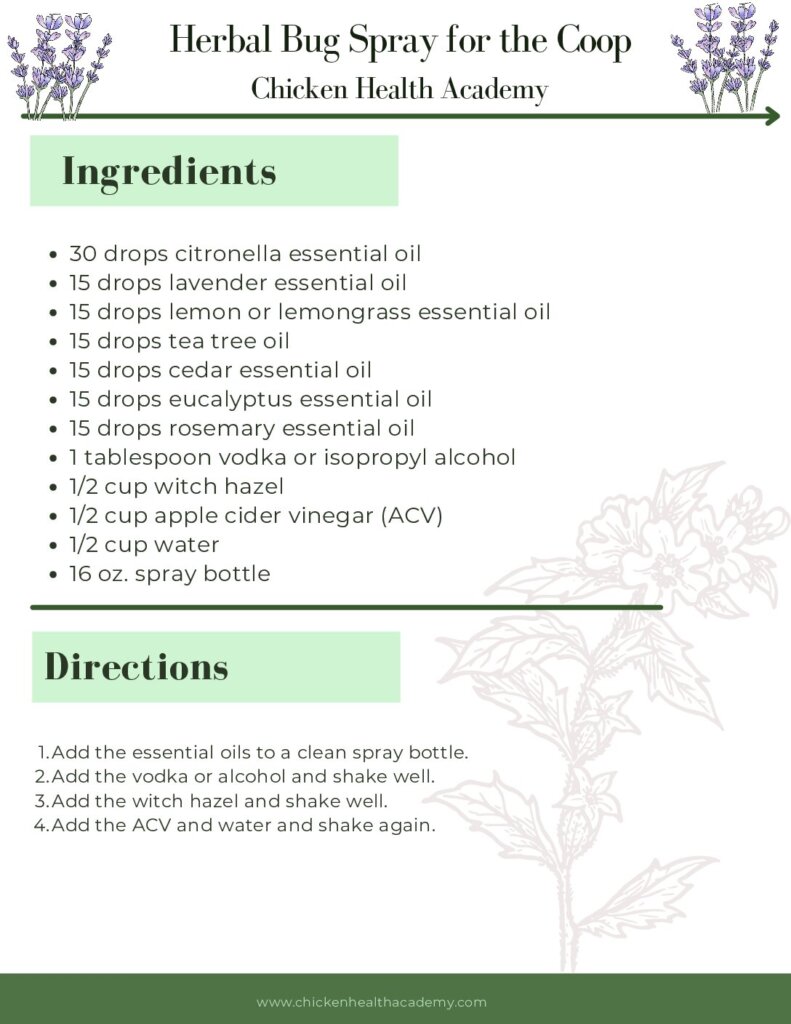
Prevention/Treatments
- Regularly checking each of your chickens for signs of parasites and any other birds they share space with (such as other chickens, turkeys, ducks, guinea fowl or pheasants) every couple of weeks is the best preventative measure you can take.
- VetRx is Heather’s preferred method of treatment. It’s 100% natural, made from camphor, Canada balsam, oregano oil and rosemary oil. It’s effective relief and prevention of respiratory diseases and fights against colds, scaly legs and eye worms.
- Clove or Cedarwood oil made into a natural bug spray is another of Heather’s favorite herbal prevention methods (see the recipe above and/or download the PDF here).
- Feeding chickens fermented chicken feed, apple cider vinegar or food-grade diatomaceous earth will aid in ridding your chickens of parasites. (Source)
- Cleaning the coop, keeping it dry and using a deep litter method will also help with this problem.
- Also, providing your chickens with a dry bin filled with food-grade diatomaceous earth for dust baths will help them deal with their own external parasites.
- If you suspect an internal parasite, you can give your chickens plain chopped fresh garlic and drop it right into their drinking water. Other methods of prevention are fermented chicken feed, apple cider vinegar or food-grade diatomaceous earth. (Source)
- Heather also recommends oregano oil (about one drop per gallon), but do use caution because it’s easy to overdose oils.
- Coccidiosis prevention can be prevented with fresh garlic and herbs like chamomile and sage, steeped in their water. Giving this to baby chicks right when they get home is a fantastic prevention method for this particular parasite. (Source)
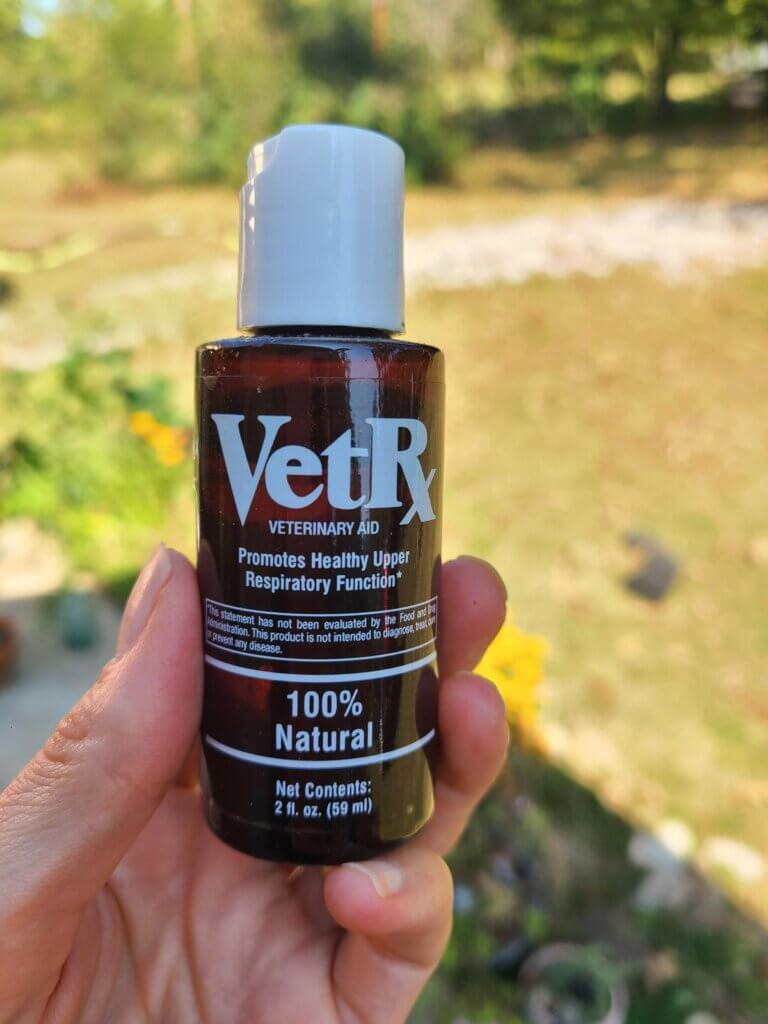
Infectious Diseases
Bacterial, fungal and viral diseases are the most common among birds. They are spread from bird to bird easily through direct contact, airborne droplets, and shared food and water sources.
These can cause intestinal, reproductive, nervous system and chronic respiratory diseases, to name a few.
Symptoms
- Coryza, for example, is a common respiratory disease with all the signs of avian influenza (sneezing, watery eyes, nasal discharge, and lethargy.) Younger chickens usually weather this virus just fine, but older chickens may be less fortunate.
- Virulent Newcastle disease (once known as exotic Newcastle disease) is a disease that affects the respiratory tract. It has many of the same symptoms as Coryza, with an awkward twist in the neck and possible paralysis of the wings and legs.
- Bumblefoot, or ulcerative pododermatitis, is when a wound on a hen’s foot pad becomes infected. It will form a hard, abscess-like “bumble” in the infected area.
Prevention/Treatments
- If you suspect the avian flu (or you hear of it going around anywhere near you), get your flock on a remedy of garlic, Chinese skullcap, oregano oil and isatis as soon as possible. Since isatis has a very strong (sometimes off putting) flavor, Heather recommends adding some apple cider vinegar or other herbs that will help mask the flavor.
- Garlic is a fantastic preventative remedy for these respiratory illnesses. Since wild birds can carry the infectious bronchitis virus, using preventative methods is important to protect your flock. Garlic helps strengthen the cellular walls so the viruses can’t get in to replicate. (Source)
- Elderberry also works like garlic and Chinese skullcap to help strengthen cellular walls.
- Chamomile and mullein tea given to chickens can help open up their airways. (Source)
- Isolate the infected chickens from other chickens and turkeys for 3-4 weeks to slow down and stop the spread of these respiratory illnesses.
- When Heather has an ill chicken, she’ll create a “sick bay” in her laundry room with a crate, and she’ll diffuse eucalyptus, rosemary and hyssop essential oils, all great for respiratory illnesses. (Note: Heather doesn’t recommend using these essential oils internally.)
- It is beneficial to thoroughly clean and disinfect the coop when you suspect an infection in your flock.
- Bidens pilosa is a plant that grows all over the United States (even up into Canada) that’s a great antibacterial and antiviral herb. (Source) (Source) It’s an herb you want to use fresh, so if you can’t find it, consider growing your own.
- Plantain is another herb that grows nearly everywhere and it’s also great for bumblefoot. You can make a salve to help pull the infection out. (Source)
Homesteading Hack: Both Heather and I have misidentified plants because there are so many variations. We recommend looking at multiple pictures of the herbs you’re searching for to make sure you’re not missing something you can forage right in front of you!
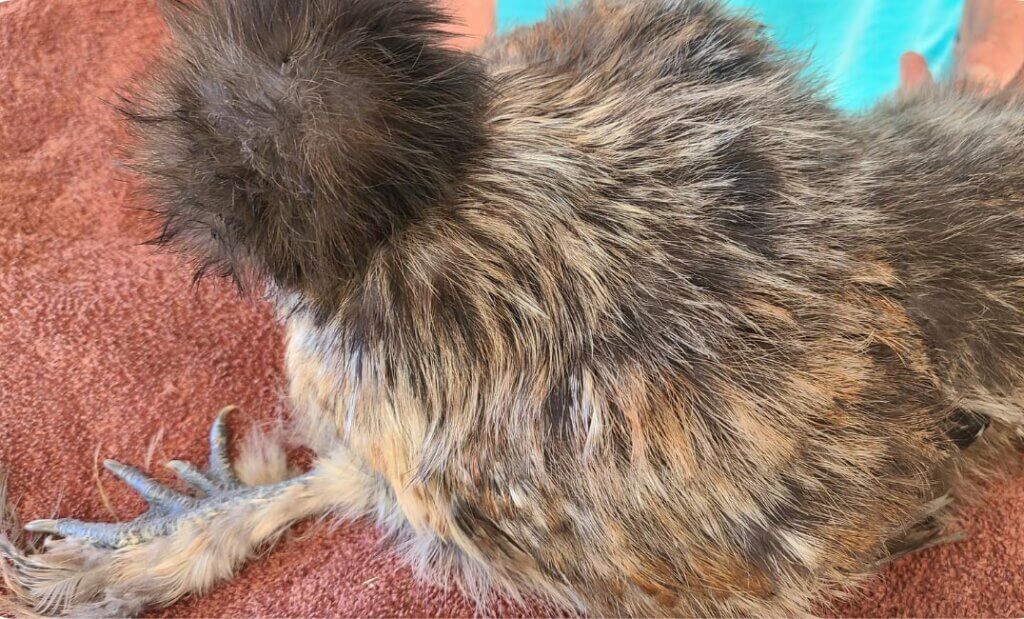
Marek’s Disease
Marek’s disease is avian cancer and causes paralysis and, unfortunately, death if untreated. It’s a virus that spreads through chicken dander when inhaled. (People cannot get this disease from chickens.)
It’s perhaps one of the most feared chicken diseases because it’s been known to wipe out entire flocks. If a chicken survives this disease, it will be a carrier of Marek’s for life. Removing it from the flock is vitally important.
Typically chickens between 12-15 weeks old are the most susceptible. We do not believe in vaccinating for this disease as it is ambient in our environment, and most healthy chickens will not succumb to it.
Symptoms
- Typical signs of Marek’s disease is a chicken that loses its ability to walk. It may have one leg flopped forward and an inability to hold her head up.
Prevention/Treatments
- Once Heather recognized the signs of Marek’s disease in her flock, she used a combination of fresh garlic, oregano oil and Chinese skullcap (not American skullcap) with her chickens and noticed a drastic reduction in the rate of spread.
- To dose chickens with Chinese skullcap, Heather recommends adding a couple of drops of tincture into a little bit of water, then administering it to the chickens down the side of their throat with a syringe. Treat chickens about five times daily.
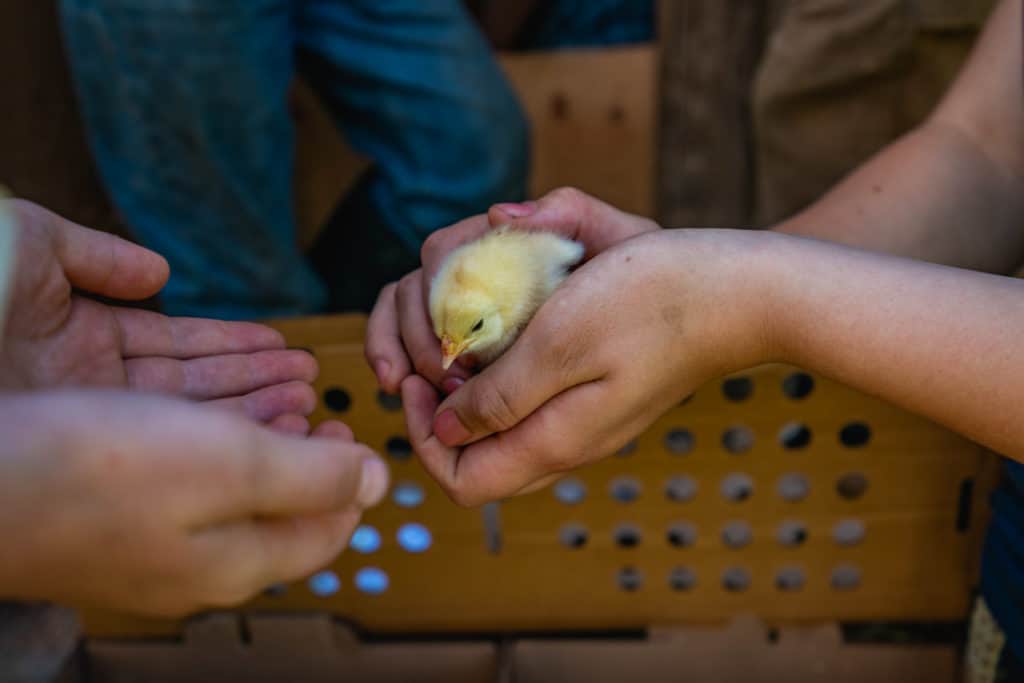
Fowl Pox
Symptoms
- If you see irritated patches or bumps on your chicken’s skin where feathers once were, sores around their beak with discharge coming from their eyes, these are fowl pox.
This disease will generally heal in a couple of weeks on its own. However, there are ways to help speed healing as well as taking preventative measures so it doesn’t spread.
Prevention/Treatments
- Reduce the spread of fowl pox by separating the infected chickens.
- Eradicate possible mosquito swarms that spread the disease.
- Keep the chickens comfortable and clean during the healing process.
- Infectious diseases can be transmitted from sick chickens to healthy chickens through your shoes, clothing and hands. Keep them cleaned and disinfected when working back and forth between the healthy and ill chickens.
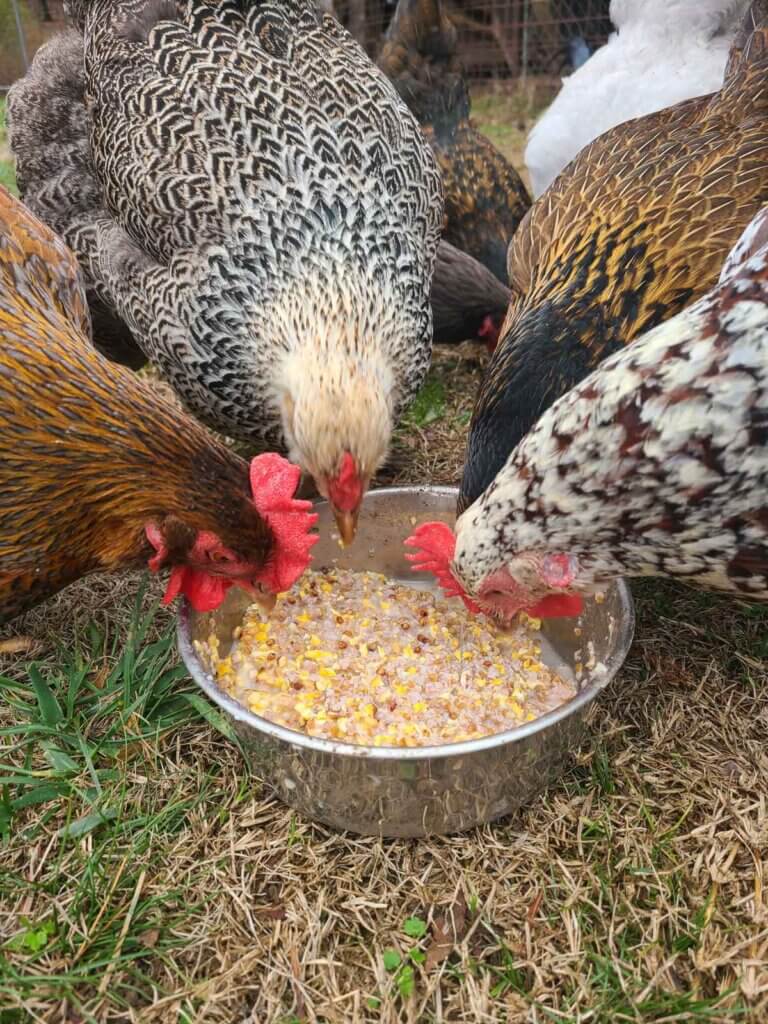
Metabolic and Nutritional Diseases
Whether your chickens are free-ranged or live in a fenced-in coop, unhealthy environments are the primary cause of these diseases. Properly maintained coops with fresh air and ample space for each bird, proper nutrition, deep litter to leave their waste in, and room to roam will deter these diseases from occurring.
Symptoms
- Chickens that look lethargic, irritable, lame, and have a drop in egg production generally need more food.
- Without a nutrient-rich diet, this can cause soft bones and beaks, which can be painful.
- An improper balance in nutrition can lead to yeast overgrowth and diseases such as sour crop or vent gleet.
- Sour crop is a yeast infection. It happens when bacteria get out of balance and an overgrowth of Candida albicans occurs (a fungal species). Sour crop causes thickening of the crop wall and sometimes dilation of the crop. In some cases, this can lead to death.
- Another symptom of a bacteria imbalance is vent gleet. This is where the hen’s vent becomes inflamed. It’s also caused by an overgrowth of Candida albicans, though it can also be caused by the Herpes virus. If you don’t have cocks in the henhouse, it’s likely caused by Candida.
Prevention/Treatments
- Always start with a nutritious feed with the proper vitamins and minerals. This is essential for healthy chickens.
- We highly encourage you to ferment your chicken’s feed. Not only does this cut down on feed cost, but it provides your chickens with probiotics, which will help improve their immune system. It’s also predigested, so your chickens can put their energy into other efforts rather than digestion (like increasing egg production).
- Heather says she gives her chickens kombucha and her extra SCOBYs from kombucha making for added probiotics.
- Adding turmeric and cayenne to the chicken’s feed or water, along with garlic, oregano oil and Chinese skullcap is a great option when fighting Candida overgrowth. Turmeric is shown to be anti-inflammatory and an immune-booster. (Source) (Source)
- Applying turmeric topically for vent gleet can help with inflammation.
Make sure to give your chickens plenty of room to roam with access to bugs and other insects as an added source of protein. When we feed our chickens, we observe the area where they are fed, and if all the feed is eaten in a short amount of time, we know they may need a bit more to satisfy them.
We are the caregivers of our chickens, and therefore it’s our responsibility to see to their good health. Nutrition is important; we strive to obtain healthy eggs from healthy chickens to feed our family.
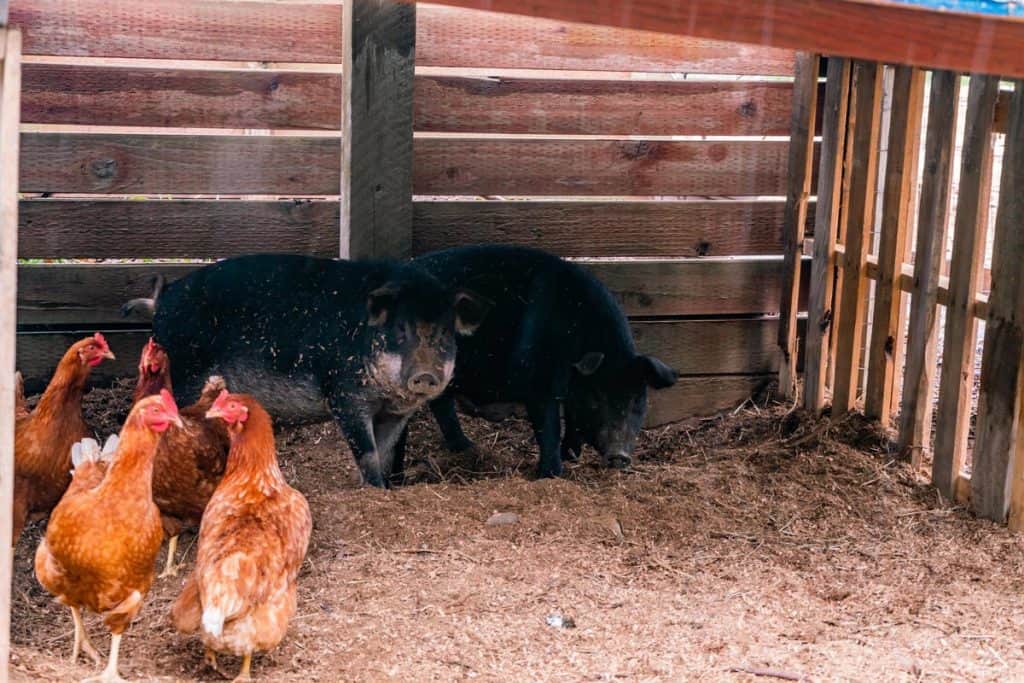
Behavioral Diseases
Stressed-out chickens can cause a plethora of problems that need to be addressed in a timely manner.
Symptoms
- Chickens that become aggressive and are pecking at other hens, eating eggs, plucking out feathers and just having a bad attitude likely need some care adjustments.
- Very rarely are there just unruly hens, it’s usually stemming from a larger issue such as not enough coop space, under-feeding, etc.
Prevention/Treatments
- Checking to make sure they have adequate food and water is imperative.
- Ensuring they have plenty of space that’s not overheated when they are in and out of the coop helps with overcrowding.
- Too many roosters can be stressful; the hens can feel overwhelmed and need more space. Never keep more than one rooster per 15 hens to reduce stress in the coop. Balance is important, and they need you to monitor their environment.
All in all, there are many ways we can be proactive when caring for our chicken’s health. Herbs are an incredible resource, and one that should go beyond use for just the people in our household. Animals can benefit from these herbs just as much as we can.
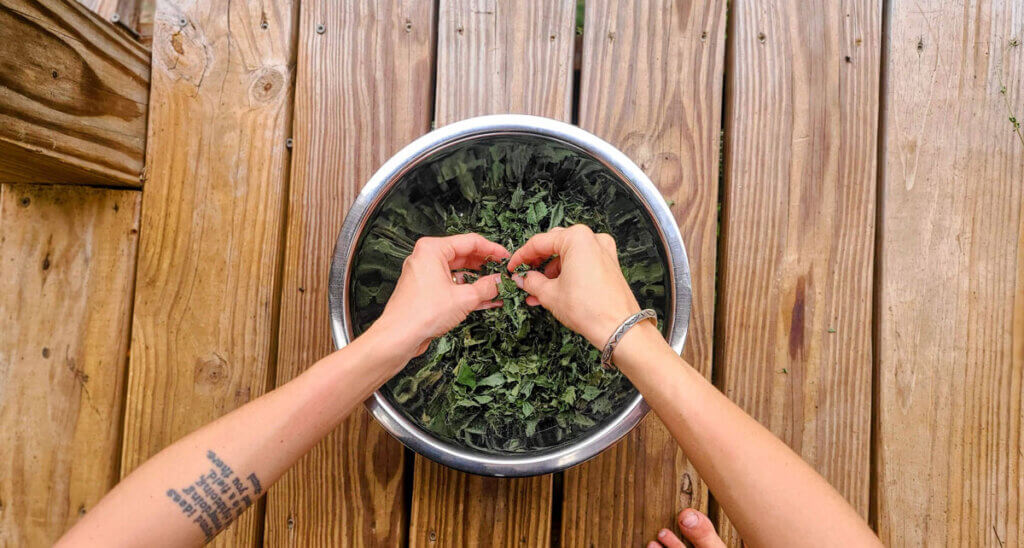
Where to Find Heather Levin
If you’ve enjoyed what Heather has to say, you’ll certainly want to learn more from her over at her website, The Greenest Acre. You can also find her at the following places:
- Instagram: @thegreenestacre
- Facebook: @thegreenestacre
- Grab Heather’s free guide on The 10 Best Herbs for Chickens.
- Join Heather’s Chicken Health Academy (it’s only $1 for the first 30 days of membership!
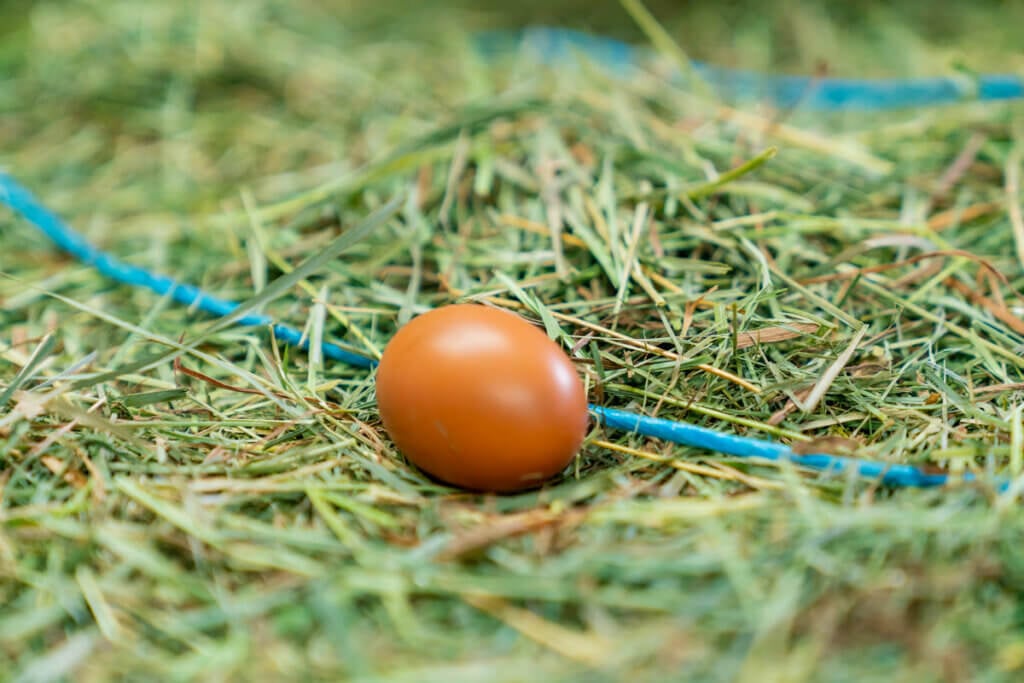
More Articles You May Enjoy
- Raising Backyard Egg Laying Chickens
- Chicken Tractor Basics & What to Consider When Building One
- What to Feed Chickens (Without Chicken Feed)
- Happy Farmer Mobile Chicken Coop Review
- Using Chickens to Restore the Land
- How to Safely Handle Farm Fresh Eggs
- Using Medicinal Herbs on Farm Animals
- Broody Hen Management
Carolyn: Hey you guys and welcome to this week's episode of the Pantry Chat: Food for Thought. This week I have a special guest and we are going to be diving in to talking about herbs to treat and prevent common chicken diseases. You know that moment when you walk out to the chicken coop and you see that hen and you know that something's not right? Oh, what do you do at that moment? If you're like me, I have all the books of trying to identify what's wrong with your chickens and what to do about it, but sometimes even then we don't feel real confident about it.
So whether it is bumblefoot and something you can cure really easily at home or all the way, the full spectrum, all the way to avian influenza, we're going to be talking today with Heather Levin, who is a good friend of mine. She's actually been writing for In the Homestead Kitchen magazine for us. And so you'll start seeing her articles come out very soon in the magazine if you are a subscriber. So I'm really excited to have her on today. She and her family live on a 10 acre homestead in rural Tennessee where she raises way too many chickens. Amen. Thank you very much. We know she's a kindred spirit, right? Keeps bees, gardens and homeschools her two boys. She also loves canning and preserving the food and fruits that they grow each year. Heather, welcome. You sound exactly like our type of people.
Heather: Yeah. Thank you so much. I'm so excited to be here.
Carolyn: Yeah. It's always good to talk to people who know what it's like to really get your hands dirty in the soil and to love our chickens and to enjoy just the fruits of our labor in a very real way of having them on our table. So thank you for coming on today. This is exciting.
Heather: Yeah. Thanks.
Carolyn: So what got you into homesteading? Before we dive into the main topic, which most of our listeners will know, we do a lot of chitchat at the beginning because what is a Pantry Chat without the chitchat? So at the very beginning, what got you into homesteading?
Heather: Well, I had dreamed of having a homestead for years and years and we just couldn't make it happen until we moved to Tennessee and could really afford a larger piece of property. And as soon as we moved out here, I had always dreamed of having chickens. And so that was really the very first thing I did. I planted a bunch of herbs because there was nothing planted here, and I bought a bunch of chickens, and I know there's a lot of people that get into chickens and they do their research and they know exactly how to set up the brooder and what to feed them, and I'm amazed when people do that. I was not like that at all. I was like, I want chickens and I want them right now. And I just went to the local co-op and got a bunch of chickens and I'm like, I'll just learn on the go.
And so I got these chickens and I fell in love with them immediately. I just loved having chickens. But as they grew older, they started getting sick and I was constantly on Google trying to figure out what was going on with my flock. And I lost birds to illnesses and predator attacks, and I wasn't really sure what I could be doing to prevent all this. And then I kind of stumbled on some articles from Lisa Steele about using herbs, and it's kind of funny that I didn't think about it at the time, but I'm a family herbalist and I use herbs all the time with my family. It just never occurred to me that I could do this with my chickens too.
I just started experimenting with pretty much giving my chickens the same thing I was giving my children and it worked. As the years went by and I experimented more with using herbs with my chickens, there was far fewer instances of illness and disease and they were just healthier and more vibrant. So yeah, it's really been a learning process, figuring out what is going to work. And I'm always experimenting with herbs with my flock because there's really not a lot out there in terms of medical research and books written specifically for using herbs with chickens. But as you know, from talking to Doc Jones, he's been a huge inspiration in what I do with my own flock as well. So you can definitely use all these herbs with your chickens and there doesn't have to be any special blends. They really cross over really well.
Carolyn: You're really touching on something that I think is such an important thing to bring out in the homestead journey for people. We go into homesteading with these walls, these lanes of understanding. Like here are my children and here are my chickens, and here's how I handle this and here's how I handle that.
Heather: Never going to cross.
Carolyn: Yeah. Don't cross. It might get messy. And we really need these moments of like, okay, we've got to break down those walls a little bit and sometimes it makes us feel like, whoa, mind blown. I can just use the herbs that I'm using for my children on my chickens. It opens up a whole world to us really, because there's a lot of people who actually know a bit about herbs, they just don't know that they can apply what they know about herbs to other things besides humans.
Heather: And it is really amazing what these herbs can do in terms of preventing illness. Like I said, when I first got chickens, I still can't imagine what they got sick with because when we moved here, they had had other chickens before. This was a working farm. So I know for sure we went through fowl pox with that first flock. Definitely we had some Marek's disease with the second flock. But since I started using all these different herbs, my chickens almost never get sick now. I mean, it's very rare that we'll have an illness. So using these herbs in a preventive capacity can work really well. And I'm just super excited to be here today to talk about this because I don't feel like it really gets enough attention, especially using herbs with animals like chickens and other livestock that you might have on your farm.
Carolyn: Yeah. I think this is great. It's a great topic to be talking about. How many chickens do you currently have?
Heather: I have 30, and that's about to change next month. I have an order coming from Hoover Hatcheries. It's going to be a lot more than 30 after next month.
Carolyn: Yeah. It's the time of year, isn't it? Do you have just chickens or do you have any other poultry right now or will you when you get your orders in?
Heather: No. Yeah, I just have chickens right now. I thought about getting Guinea and I keep backing away from it, but yeah, it's just chickens right now.
Carolyn: Well, sometimes guineas are hard on marriages. Let me just tell you. I love my guineas, but every so many years I have to give up the guineas and go, okay, we can butcher off the guineas because they are very, very loud and I'm not always the one who's doing projects in the barn and getting followed all day long by a gaggle of guineas. So yeah, definitely. And then do you hatch out any of your chicks yourself or do you have your hens hatching out any or do you-
Heather: Yeah, I have hens that hatch out. And most of the time if they're roosters, I'll give those to neighbors or sell them off. Especially last year, I think every chick that hatched out here, save one, was a rooster. So we had so many roosters. So I told myself this year, I'm not letting anybody hatch out, and I know my will is going to crumble because as soon as they start sitting on those eggs and I'm like, oh, we're going to have baby chicks and I can't not let them hatch out eggs because it's so cute to watch the mama hens with their babies, and so I know I'm going to crumble with that.
Carolyn: There's other values to chickens aside from food value between eggs and meat, and I think entertainment value and companionship actually are up there pretty high.
Heather: Oh yeah, definitely.
Carolyn: Great. Okay. I want to dive right in because I think we have quite a bit to cover today, and let's talk right off about the common chicken diseases, what they are and why are they so common?
Heather: Well, chickens get sick with different bacteria and viruses just like we do, and they're always circulating. They can be in the soil, they can be carried in from wild birds. So there's really a lot that chickens can get sick with. And because they're a prey animal, chickens can be really, really sick, have one foot in the grave before we even know that there's something wrong. And so that's why herbs can work so well as a preventative is you can really stop those illnesses in their track if you have them on a regimen of preventive herbs. So if we're going to talk about all the different things that chickens can get sick with, we could start with something like parasites, which is really common in the spring and summer, and they can especially be prevalent when it's wet outside. So different bugs like lice and fleas and ticks and red mites and scaly like mites, chickens are all susceptible to those.
And especially here in Tennessee, the ticks are so bad. I mean, it is just like a constant battle to get rid of those ticks. So if you're going to do a health check with your chickens just to see if they have any of these parasites, you're going to look for things like them having a dirty vent. It's going to look like there's almost actually pieces of dirt around their vent, along the feather shafts. They might be listless or you might notice a drop in their egg production and they'll have maybe some bald spots where they're constantly pecking or they might have some red and scabbed skin. So those are all things that you want to look for to see if you have a parasite problem.
Carolyn: Okay. Would they be itching also if it was a possible thing?
Heather: Yeah, and you'll see them with their ... They'll just be scratching away with their feet. So if you do think that you have a parasite problem, one natural product that I really love to use is VetRx, and that is really great, especially for scaly leg mites. Those are mites that actually get up underneath the scales of the chicken's feet and will actually cause them to raise up and it can be very painful and cause an infection. So VetRx is great for that. You can also use clove oil or cedarwood oil. Both of those essential oils are great because they dissolve the exoskeleton of the ticks and the fleas, so just making a spray with those. And I did make a PDF download of a herbal bug spray, so hopefully we can put that in the show notes because the herbal spray that I use works really well. So you can actually mix all these essential oils together and spray it right on your chickens and you can actually watch. It's almost like the bugs will start to dissolve. And that's mainly from the clove and the cedarwood oil because it just makes them dissolve. It's amazing.
Carolyn: That's amazing. Yeah. We'll put that in the blog post attached to this podcast. So you guys check out the link below for the blog post and then you'll be able to grab that from there. So thank you so much for that, Heather. I'm excited to give it a try and to see it. Do you ever use anything like dust baths, like diatomaceous earth dust baths or-
Heather: I do, yeah. It's definitely important for chickens to have an area where they can take a dust bath because that's so important for helping them get rid of the lice and mites that they're prone to get. But you can put DE in the dust bath and that's another product that works just like the clove and the cedarwood to really help dissolve the exoskeleton of those parasites.
Carolyn: That's good. Just make sure you're always using food grade and not the pool diatomaceous earth. Don't get those chemicals in there. But the food grade is a very natural product and it can be great for health in those different ways, so that's great. Good. So those are parasite. Now most of what we just talked about are for topical parasites. Do you do anything different for maybe an internal parasite?
Heather: Yeah, there's a lot of different herbs that you can use for internal parasites, and one of my favorite is just plain garlic. Just giving your chickens fresh garlic. And as we go through all these different illnesses, garlic is one I'm going to bring up again and again because it's anti everything. It's antibacterial, antiviral, antiparasitic, antifungal, anti-inflammatory. Really, I tell my members in Chicken Health Academy, if you only have time to do one thing for your chickens, give them fresh garlic in their water. To me, that is just the panacea of ... If you're going to do one thing, garlic is going to solve so many of your problems. And you definitely want to try to use fresh garlic. When garlic is dried, a lot of the compounds are lost in that drying process. So just chopping up two cloves of garlic and putting it right in their water and just swapping those out every couple of days is really such an easy way to give your chickens the benefits that are in garlic.
Carolyn: So really just that easy. Just chop it up. You're not having to heat it, you're not having to do anything. You just drop it right into their drinking water and let it infuse slowly in the drinking water?
Heather: Yep. And-
Carolyn: That's pretty easy.
Heather: Yeah. And if you are at a point where maybe you're working a lot or have a lot of farm chores, you can even buy the jarred. You can buy it in the supermarket, the jarred garlic that's fresh and just keep that in the fridge so you don't even have to chop it up. But definitely try to use fresh over dried because it's just so much better for your chickens.
Carolyn: Oh, great.
Heather: So also I really like using oregano essential oil. It's a great antiparasitic. I don't usually recommend people use essential oils a lot because they're so potent and it's so easy to overdose when you're using an essential oil. But oregano oil is definitely one that I always recommend people use because it's just such a great antiparasitic. It's antiviral. It's antibacterial. And it is very potent though, so you definitely just want to do maybe one drop per gallon for your chickens and just leave it at that. Just give it a good stir. Because if you just drop it on the water, it's going to sit right on the top. So you do need to mix it in as much as you can. But oregano oil is one that if we're traveling, we don't ever travel without oregano oil because it's such a great remedy for food poisoning too. And I know chickens don't really get food poisoning, but we do. So I always take it with us whenever we go anywhere.
Carolyn: As a family herbalist, it's so wonderful when you're like, I can have one set of remedies and I can apply it all the way across the board. I can apply it to the different animals, I can apply it to the people in my family. That just simplifies things so much. Instead of having the vet box where it's like, this is the chicken vet box and the cow vet box, you're like, no, I just have my herbal remedies ready to go for everybody. That actually really simplifies things a lot.
Heather: It does. I mean, I do have a chicken first aid kit, but when it comes to giving my chicken's herb, I have a huge cabinet in our kitchen where I keep all my herbal stuff and it's all in one spot. So anything I would give my family, I'm also giving to the chickens and the dogs and the cats and yeah, there's no separation, which is really great.
Carolyn: I think if there's only one takeaway for somebody to take out of this talk today ... Hopefully there'll be a lot. I've already learned myself. I'm going to get out there with garlic myself and get it into the chicken water. But if there's only one, I think the important one is that you don't need special things. If you just have high quality herbs that you can use to treat your family, you can apply them in other places, and it's not just even the chickens. That goes a lot further than that to the other livestock. Great. Okay. So parasites were the first one. What else might we deal with when it comes to chickens?
Heather: Well, I just want to touch quickly on coccidiosis because I know so many people worry. That's another parasitic disease that chickens are very prone to. But everything that I just talked about, you can also use for coccidiosis. But you can also ... There are herbs like chamomile and sage, which are also great antimicrobials, and you can give those even to your baby chicks. You generally won't see coccidiosis before three weeks because it takes time for that parasite to reach dangerous levels in the brooder. But you can give your baby chicks fresh garlic. You can put chamomile and sage tea right in their water. You can give your baby chicks pretty much anything you're going to give your adult hens as long as they have chick grit if you're putting this in food. But yeah, I just urge people to always ... Especially when you're having chicks shipped in, their immune systems are stressed from shipping so giving them fresh garlic, a wonderful tea like chamomile or sage right off the bat, maybe with some Nutri-Drench put right in the water can definitely help get them off to a healthy start and maybe help prevent illnesses like coccidiosis.
Carolyn: Great. Good. All right. Moving on from parasites, what else might we face?
Heather: All right. Well, we can talk about bacteria. There are so many different things that can infect our poor chickens when it comes to bacterial diseases and a lot of them cause respiratory illnesses like chronic respiratory disease. Coryza causes respiratory symptoms. Chickens especially have very sensitive respiratory systems, so they're very prone to getting these different bacterial diseases, especially in their lungs. So again, I already mentioned garlic, but garlic is really fantastic for helping prevent some of these respiratory illnesses and it helps to strengthen the cellular walls so that bacteria and viruses can't get in to replicate. Now, other herbs like elderberry and Chinese skullcap, they work the same way by strengthening cellular walls. So that's why it's such a great preventative. So if you can keep your chickens on something like garlic all the time, it's really going to help prevent a lot of these illnesses because they won't be able to replicate as easily.
So in addition to just giving garlic every day, especially for respiratory infections, I will use essential oils like in a diffuser. Oils like eucalyptus are great because if a chicken ... I do it with my children too. If they're breathing in these essential oils, some of them, especially eucalyptus, can actually help kill the bacteria that are present in the lungs. So when I have a chicken that's suffering maybe from sneezing or coughing or maybe coming down with something, I'll put her in a sick bay and put her ... We have kind of a small laundry room, so I put the sick bay in the laundry room and shut all the doors and just put my diffuser in there with some eucalyptus and maybe rosemary and hyssop. All of those are great for respiratory illnesses and I'll leave her in there for a day or two just breathing in those essential oils. And it is amazing how effective that can be for just calming those symptoms and helping her get over that. I definitely wouldn't give these essential oils internally, but breathing in oils like that can really help with a respiratory infection because they're antimicrobial. So that can be a great way to easily help your chickens get over the hump and start getting better.
Carolyn: Oh yeah. That makes a lot of sense. That's very interesting. How often do you find that you need to separate out an ill chicken? Is that protocol for you first thing you do if you find one that's not doing well?
Heather: Yeah. If anybody in my flock starts to go downhill, if they're showing any symptoms, I always pull her out of the flock and I've got a dog crate that I use that's big enough for her to be in there comfortably with food and water, and I keep bedding in there and usually I'll put her inside the house just so I can keep an eye on her. But yeah, you definitely want to isolate chickens if you notice that they're not acting normally.
Carolyn: I think, again, we're just seeing how what we know about family health, we can apply in other places. That's what you do with a child. Somebody's not feeling well, let's put them to bed in their bedroom, keep an eye on them, make sure they're resting and they're not stressed in some way from the other chickens. Chickens have a tendency, as soon as one of them gets stressed, the other ones can start going on the attack and get really [inaudible 00:22:32] towards that hen, and that does not help anybody's healing if they're getting attacked constantly. So getting them into a place where they're safe, they're comfortable, they're secure, and they don't have to face maybe quite as much input. That's kind of standard medical practice so it's great to just see how it's applied.
Heather: Yeah. I also want to talk going back to the respiratory because, like I said, chickens can really be prone to these respiratory diseases. So if you have chamomile tea that is very healing and soothing for the respiratory track, there's also a plant that grows prolifically around here. I don't know if it grows everywhere, but it's called mullein. Do you have that where you are?
Carolyn: We have a lot of mullein where we are. Yeah, exactly.
Heather: Yeah. So that's another great herb that really grows along roadsides. I mean, it's fairly easy to find and that is a great herb to dry and drink as a tea because it really helps open up the airways, and I've given my chickens mullein before. If I notice that they're sneezing or coughing any type of respiratory illness, I always turn to chamomile and mullein to help just open up their respiratory tract and help them clear out that congestion.
Carolyn: Yeah, that's a great herb. Good one. I definitely use that in the household with people, but I have never considered giving that to chickens. That's great. I love it. Good. What are some of the other things we might face? We've got kind of a long list of them, don't we?
Heather: I know.
Carolyn: All these different categories of things that you might run into when you're dealing with a chicken illness. Just like humans. So what's another one?
Heather: Definitely I would like to talk about bidens pilosa because that's kind of an herb that I have looked for on our property for years. It's also called Spanish needles or beggar-ticks and I could never find it. Our property is such that we've got [inaudible 00:24:45] and we have a creek and a spring as well as forest. So we actually have quite a lot of diversity growing just naturally on our property. Bidens is a plant that grows just everywhere in the southeast and the southwest, and I've seen it range as far up into Canada, so it might be growing where you are as well. And it is a wonderful antibacterial and antiviral and it's especially indicated for staph infections. So I looked for it everywhere and never could find it here. And so I was talking to my members at Chicken Health Academy and we were all talking about what we're going to plant this year.
I'm like, "Well, I'm just going to plant bidens because it's not growing here and I just really need it." Especially for the Bumblefoot, because it's been going around with everybody and bidens is a plant that you definitely want to use fresh. So the drying, you lose a lot of the beneficial compounds with bidens when it's dried. So I was just about to order seeds when I happened to see a picture of ... It was a different picture of bidens and I saw the seed pods and I'm like, "Wait a second. I know what this is." It's growing all over my property and I never knew it was bidens because I was always looking for the flower. It has a little white flower with a yellow center, and the bidens that grows on my property doesn't flower. So it was right in front of me this whole time and I just never knew because I was looking for one thing.
So I just wanted to bring this up because especially as people start foraging for some of these herbs, it really helps to see as many different pictures of a plant as possible because you can look at one picture of a plant and it may look really different in the picture you're looking at compared to how it's out growing in the wild. So as you're foraging for maybe plantain or nettle some of these other herbs that I wanted to talk about later. But yeah, just try to look at many different pictures because it might be that you're looking at the plant the whole time, but you just might not even know that's what it is.
Carolyn: That completely happened to me back many, many years ago, right at the very beginning of my foraging career, and I was actually just a teenager in Southern California and I had all these books and I could not find plantain for anything. Well, come to find out later when I moved to Tennessee and I instantly identified plantain, the reason was is because in Southern California it's so dry that my plantain was literally an inch tall. The leaves were. And here I'm seeing all these pictures of these leaves that are like a foot tall and these huge leaves and I just couldn't identify it one to the other. Now of course, once you start experiencing that plant and you identify it, you can see all of its variations and you start to really get to know it. But yeah, it's a really good thought. Get a lot of photos and if you can, find somebody who already knows what the plant is and let them just point it out to you. It just is going to save you so much headache.
Heather: Yeah. Plantain is such a wonderful ... That was another one I was going to bring up later, but while we're talking about it, plantain is great to use for bumblefoot because it's such a great drawing agent, and so you can put the poultice ... I just usually make a spit poultice when I need to draw an infection. But you can just make a spit poultice, or if you want to make a tincture with plantain, you could put that right on the staph infection. And the thing with bumblefoot is it can really take a while. I mean, it's a lot of work to pull that infection out. I know some of my members in Chicken Health Academy have been battling bumblefoot for weeks, like cleaning with the Epsom salt multiple times a day and just trying to pull that infection out. And that's why I was so excited to try to find bidens pilosa because I really think that that could be an effective remedy for staph and maybe speed up that whole healing process. But yeah, plantain is one of those herbs that just grows just about everywhere. I mean, I bet probably anybody watching or listening to the podcast could go out in their yard or down the sidewalk and find plantain when it's growing because it's really ... Anywhere humans have gone, you can find plantain.
Carolyn: Yeah, absolutely. It's very ubiquitous. It's one of those herbs that ranks at the top of herbs that I think people should know about just because you can find it wherever you go. Whether you're away from home or you move or whatever happens, you're going to find plantain, kind of like dandelions. Dandelions, pine, plantain. They're all over the place just waiting for us to need them, which I just love.
Good. All right. What else might we deal with when it comes to chickens?
Heather: Well, we also need to touch on viral infections because that's another really broad area of different illnesses that our chickens are at great risk from. One of those is Newcastle disease, which is super highly contagious. It causes a lot of respiratory symptoms. And Newcastle disease is often confused with avian influenza. They have very similar symptoms of just respiratory distress and sneezing and coughing. So it can be really hard to tell the difference between those two. And in terms of treatment between that and maybe something else like infectious bronchitis, we're going to be using pretty much the same herbs to treat all of these different viral infections. Marek's disease is another really important viral disease that if you have chickens, you're really going to have to deal with Marek's disease. The thing about Marek's is there's a lot of fear when it comes to Marek's disease, and the same is with the avian influenza.
And as we've seen with avian influenza, it can cause just massive destruction when it sweeps through flocks and there've been huge poultry farms that have had to cull their entire flock over diseases like avian influenza. But this is where these preventative herbs can come in so handy just by strengthening our birds' immune system to avoid some of these really pathogenic viruses that are spreading. Now, when it comes to Marek's disease, there's not really any type of vaccination for these other respiratory diseases like the avian influenza. But Marek's disease is something that you can vaccinate your chicks from, but the chicks do have to be vaccinated the day they hatch and it's pretty much something that has to be done at the hatchery. I know everyone's going to have a different opinion on vaccination. When it comes to the Marek's disease vaccine, I'm very pro vaccine because it's not a foolproof vaccine, but I've had Marek's disease sweep through my flock and a lot of members in Chicken Health Academy have also been dealing with Marek's and it can be a really devastating disease. It causes pararylous.
There's five different forms of Marek's, but the most common is the nerve form where the chicken will kind of lose its ability to walk and maybe have one leg flopped forward. And her poor head is ... She just can't hold her head up. But thankfully there are some herbs that we can use to maybe not wholly prevent Marek's disease, but lessen the severity of some of these symptoms. I'm going to say it again. Garlic. I love garlic so much. If you only do one thing, please give your chickens garlic because it's so good. But oregano oil, this is one that I have direct experience with. I don't have any scientific proof that oregano oil works to protect the rest of your flock, but I used it because some of my silkies came down with Marek's a few years ago.
It also swept through my neighbor's flock and once we started seeing the symptoms and we were like, "Oh my God, this is Marek's," I got everybody on oregano oil. We got everybody on another herb, Chinese skullcap, because that is a broad spectrum antiviral, and it works kind of like garlic does by inhibiting the viral replication. So we got all of our flocks on these three things. We had garlic, oregano oil and Chinese skullcap. And we really noticed a reduction in the rate of spread. We did have a few more chickens fall ill with this disease, but it wasn't a devastating, massive outbreak. So I would urge anybody who's maybe ... If they suspect that Marek's is starting to go through their flock, focus on those three. Garlic, oregano oil and Chinese skullcap. There is an American skullcap and that's more of a nervine, so that won't do anything for Marek's. You definitely want the Chinese skullcap for that.
Carolyn: Right. Wonderful. I feel like we're seeing a pattern emergent here, right? It's like if you have chickens that you want to keep healthy or they get sick, there's a protocol that we're looking at of keep them healthy with some garlic. If you start seeing some symptoms of something, maybe it's time to add some oregano oil and maybe some of the Chinese skullcap right there just to kind of head off before ... Because sometimes it takes a while. You go out, you see ill chickens, and then you're trying to research. What is this? What are the symptoms? Maybe you're not seeing the full range of symptoms yet, especially if you're especially in tune to your flock and you're watching every day to make sure everybody looks healthy. You may catch early symptoms and not be seeing it all. So there are steps that you can take regardless of what the disease actually ends up being right at the very beginning. Get that garlic in there, get that oregano oil in there, and consider pretty quickly adding some Chinese skullcap. And how would you give or administer the Chinese skullcap?
Heather: Especially when you're using a tincture with chickens, when you're thinking about an adult dose, that's usually a teaspoon or one ... I kind of just eyeball it at one dropper full. So an adult dose is one dropper. So when you think about a chicken, which is maybe five or six or seven pounds, you really have to ... When you're thinking about dosing, it's really just going to be a few drops. And the easiest way I have found to give a chicken a tincture is to put it in a little bit of water and just use an oral syringe and just kind of dribble it on the left side of their throat, making sure it goes down their throat and just do that several times a day.
Carolyn: Would you do that over putting it in the water for the whole coop?
Heather: Well, yeah. If you're doing a widespread application for your whole flock, I would definitely recommend putting it right in their water. I guess I was thinking when I'm giving a chicken, a tincture for an acute case, something very specific, this chicken needs treatment right now, that's how I'm going to give it to her, just a few drops and a little bit of water and just dribble it down her throat with a syringe.
Carolyn: Okay. That's the laundry room protocol. When they get isolated, taken into the ER, they get it right into the mouth with the syringe. That's great. So then the same protocol would kind of apply for something like the avian influenza that we've heard a lot about over the last few years. It's a scare. You've kind of already talked about it a little bit here, but that's been a big scare for a lot of people and there's even been states that have started ... There's been rumblings about destroying private flocks of chickens just to try to stop the avian influenza from spreading. I know we're in Idaho. There's a lot of chicken producers apparently in Idaho, and so there was a lot of rumblings about what's going to happen if this hits here really badly. So would you use the same protocol for the avian influenza if you think that might be what you're facing in your flock?
Heather: Yeah. I definitely would. Especially with an herb, like Chinese skullcap because it is a broad spectrum antiviral, I would get my whole flock on the Chinese skullcap, the garlic, the oregano oil. I would also probably throw some isatis in there. Isatis is an herb that is in the cabbage family and it's not very common in this country. I have to get the root dried from a specialized herbal dealer. But every time we have ever come down with any type of flu or any type of viral infection we always turn to isatis. And it tastes awful. Of all the herbal tinctures that we take, and we take a bunch, I would say isatis is definitely the most foul tasting one of them all. It really tastes like licking someone's sweaty feet. It's awful. But it's very effective.
So I would definitely recommend getting your flock on isatis. And these are all herbs that you could put right in their water. Since you're not treating an acute condition, if we're just using this as maybe a preventative measure, just start mixing it in with their water and you might want to throw ... Because especially isatis is so foul tasting, I would also recommend throwing some herbs in there that are going to mask that taste so your chickens will actually drink the water. So maybe throwing some apple cider vinegar in there or some fresh mint just to mask the taste of some of those really strong tasting herbs so that your chickens continue to drink and continue to get those good herbs in their system.
Carolyn: That is definitely an herb we have in our flu preventative tinctures in our house too, and it's one that is actually an amazing herb. If you're not familiar with it, it's worth getting to know it. But yeah, I agree. That flavor is ... It's something else. You think you're pretty solid about taking things that don't taste good, that is going to push everybody's bad-
Heather: I know. It's a very special treat when you have to take Isatis.
Carolyn: Exactly. I have to make sure to have something like a good spoonful of honey to follow it up for the kids because you got to get something to get that flavor out of your mouth. So far, we've really talked about some of the more infectious diseases, things like the bacteria, the parasites, viruses, but there are other things that can really affect the flock health too. Some of them are very nutritional. Underfeeding your chickens. It's going to make them not healthy. So let's talk about that for just a minute and things that we can do to help make sure we have really well nourished and well-fed chickens. Because we know from human health there is a difference between well-fed and well-nourished, right?
Heather: Yeah. Definitely.
Carolyn: You can be very well-fed and be incredibly undernourished at the exact same time, which is a lot of why we see so much obesity in our culture at the time is people just keep eating and eating because their body is saying you need more nourishment. And so they keep popping potato chips or whatever it is into their mouth and they're not getting the nourishment that they need, but they're getting more calories than they do need.
Heather: Yeah. Definitely having a foundation of good nutrition for your chickens is so important because like you just said, our own health depends on having a really healthy diet so that our bodies have the vitamins and minerals and amino acids they need to fight off these different diseases. So making sure that your chickens are getting everything they need either by giving them layer feed, limiting their treats, trying to give them access to fresh bugs and fresh greens, which can be challenging in the wintertime when none of that is growing. But if you can do things like maybe starting to sprout grains and seeds for your chickens, that's a wonderful way to get them fresh greens every day. And I also love fermenting feed for my chickens. And fermentation, it's such an easy thing to do. And I know a lot of people feel really overwhelmed when they think about fermenting anything, but especially grains for their chickens. But fermentation really opens up a lot of the vitamins and minerals and other nutrients in something like if you do layer feed or mix in grains like quinoa or corn or barley. It really opens up the amount of available nutrients in whatever you're fermenting so that your chickens are getting more nutrients, but they're actually eating less.
So if you start fermenting on a regular basis, it can actually help cut your feed costs because your chickens are still getting all these great nutrients, but they're eating maybe around 20% less feed because their bodies are getting what they need. So yeah. Fermenting. I just always recommend people do that and it really is as simple as just putting grains in a jar, covering it with water and letting it sit, stirring it every day for three days in a warm room out of light. And just like when you're making sourdough or making sauerkraut, it's going to smell tangy and fresh. A good healthy ferment is not going to smell bad. So I always have in my kitchen various jars in different stages of ferment and it does not stink up your kitchen or anything.
And my chickens love it. When I go out and they figure out that I'm carrying their fermented feed, it is like a mad rush because just the flavor, it improves the flavor and they want to eat more. So there's never any leftovers when I take out fermented feed for them. But that's a great way to boost their immune system because the fermented grains is going to give them so many healthy probiotics, and that is a great immune booster. So when you think about helping your chickens overcome a lot of these viruses and bacteria and preventing them getting sick in the first place, giving them fermented feed is a great part of just setting them up with a great foundational nutrition.
Carolyn: We scale up around our house. Right now we have over a hundred chickens.
Heather: Oh my goodness. Wow.
Carolyn: We'll do about 600 I think this year, broilers that we'll raise, so we can have a lot of chickens on the place in addition to a lot of other poultry at any given time. So our fermenting program looks more like a long line of five gallon buckets.
Heather: Yeah. Oh my goodness. That's amazing.
Carolyn: But we do the same thing this time of year. It's so cold, it's freezing outside and those buckets will freeze and here they'll freeze solid. And so of course that stops fermentation right there as soon as something's frozen. So we have a long line of chicken buckets in the kitchen area where we have a wood burning cook stove that runs a lot of the time, and so it keeps it warm and keeps them going and fermenting. And it's just a great way to go, whether you're human, you're a chicken. In addition to all the health benefits that you just listed for the chickens, it also predigests the food, which means that the animal's body is able to spend its energy doing something else rather than all the work of digesting, which means you've got more energy for maybe egg laying, for staying warm in the winter and having better body condition, for the immune system to have to really fire up and be active. It really helps give the animal a lot of available energy that's still left in our body, and so it's just a great thing to do all the way around.
Heather: I also wanted to mention too, as we're talking about different healthy things you can give your chickens. Because we brew our own kombucha here, so I'm always giving our chickens some of the kombucha that we're brewing. When we have extra scoby I put that out for them. Scoby is the ... It's a fleshy type of bacteria in yeast. It actually looks like a diseased organ. But the scoby is what is making this ferment. But chickens love it. It's so good for them, and when I put out extra scoby for them, they gobble it up. And the scoby is also great. I've put it directly on wounds. It's great to accelerate healing in wounds. So if you do brew kombucha, you can give that to your chickens. I usually will put out a quarter to a half a cup in their water. Just mix it right in when we have extra and they really like the taste of it.
Carolyn: Yeah. That's a really good thought. So are there any ... Let's see, are there any other herbs that you would give preventatively or is it mostly the three that we've talked about here is the top ones you've talked about? The garlic, obviously, the oregano, and then the Chinese skullcap is another one. Do you tend to give the Chinese skullcap preventatively or just when there's a flu or something in the area?
Heather: With the Chinese skullcap, I generally use that when there's a specific issue that I have to deal with. If we're talking about just general herbs that you give your chickens every day, I would definitely recommend the garlic, as I mentioned. Oregano. Turmeric is another one that I give my chickens on a regular basis because it's a great anti-inflammatory, it's a great immune booster. Research has shown that it's effective against candida, so if you're dealing with an issue like sour crop or vent gleet, giving your chickens turmeric internally and then also externally when you're dealing with the vent gleet can really help them overcome an illness like that. And especially sour crop and vent gleet. That's another illness that I've seen that's been going around a lot with Chicken Health Academy members over the past six months. So yeah, turmeric, I will mix in with their feed. The problem with doing a dried spice like that is it can sift down to the bottom so that your chickens aren't getting as much. Whenever I put out fermented feed, I always mix in turmeric right into that.
And that's another thing. If you are making your chickens anything like if you have extra eggs or if you're giving your chickens oatmeal or fermented feed, throw as much as that good stuff into that as you can. The fresh garlic, different herbs and spices. Cayenne is another good one that I put in their fermented feed. Once it's done fermenting is when I'll add some of these herbs and spices in. Because cayenne is great for reducing inflammation and kind of boosting the immune system especially in the wintertime, helping their blood just get moving and help keep them warmer. But any fresh herbs that you have in your kitchen, just feel free to just start experimenting and put those in whatever you're putting out for your chickens because they just love it and they're going to get all the benefits of what you're putting out.
Carolyn: Yeah. That makes a lot of sense. Okay. Really quickly before we have to wrap up, I would love it if you would take us through your process when you walk out to the coop and you identify that you have a hen that is not doing well. What are the different steps that you take?
Heather: Well, the first thing that I'm going to do is if she's generally in the coop, huddled down, obviously not feeling well, I'm going to pull her out of the coop and put her in sick bay and just start going through a checklist of, well, what seems to be wrong? A lot of times I will jump to is she egg bound? Because a lot of times if a chicken looks sick, that can be the first thing that I think might be wrong. So I'll do a quick check to see if she's egg bound. And that's just super easy to do. You'll just put a glove on your hand, lube it up with maybe some olive oil or coconut oil, and just gently insert your fingers into her vent about two inches just to see if there's an egg stuck in there. Most of the time, thankfully it's not egg binding, but just because that is an issue that is so quickly fatal, I always check for that first.
But I'll start looking for any other symptoms like is she sneezing? Has she been eating? Did she stop laying? So it's almost like you have to go down this rabbit hole of just checking off what is amiss. And then if it's something generally, I'll be able to figure it out fairly quickly what's wrong with her. But if not, then that's when you start turning to your library of books or get on the internet to start researching and figuring out what could possibly be wrong with that chicken. But yeah, pulling her out of the flock so you can really observe her more closely is always the first step.
Carolyn: Okay. And then do you do anything for the rest of the flock automatically? I know in my family when somebody starts not feeling well, we all start a different protocol of everybody else know there's something in the house you need to start taking extra precautions. Is that where you would do something else for the rest of the flock?
Heather: Yeah. I already have my girls on garlic all the time. I do oregano in their feed, like dried oregano or fresh. So if I suspect that something is starting to go around, that's when I will get them on the oregano oil. I'll start mixing it into their water and get that inside everybody right away. But yeah, like your family, it's like when we're sick it's like, oh, we're getting on fireside or we're getting on elderberry. So it's like, you're right. You do have to take a different more defensive position. Like, okay, this is what we're going to do. But yeah, because everybody is already on garlic, we don't really see that much illness anymore, which is why I just tell everybody, if you can get your chickens on the garlic, it's really going to prevent so many problems down the road.
Carolyn: I just think it's wonderful because garlic is easy to grow. It stores so easily, and then it's good for just about everything besides from being delicious to helping everything be healthy. I just think that that's not a mistake. I think there's a lot of intelligent design there. I think it's a good clue to say maybe we should start using garlic.
Heather: And that's the thing. So many of these herbs that are so good for our chickens are so easy to grow. It definitely makes treating them more cost-effective when you're growing them. So just making a simple herb garden. Maybe just starting to grow your own garlic. Definitely herbs like oregano and thyme are great for your chickens. I also grow a lot of stinging nettle, which is great to give your chickens during molt because it's so high in iron and they really love it dried or cooked. So yeah, I would just urge people to start experimenting with what would I like to grow for my family that I can also give to my chickens because once those herbs start coming back year after year, you don't have to do anything. It's like they're just doing their own thing and you can just go harvest whatever you need, so it makes it really easy.
Carolyn: Yeah. I love that about herbs, and that was one of the reasons that I originally got into herbalism for my family is because the herbs are there whether I need them or not. Once you get them planted and established, your bigger deal is what do I do with all this oregano that's now spreading and taking over? Which is great when you can say cut it off and throw it in the chicken coop. It's good for them, they'll enjoy it and it helps all sorts of things. So I think it's just a win-win when you can be growing all of your own herbs, or at least a big handful of them, and you can sprinkle them generously everywhere. You get to be the herb fairy and you can put them in the coops and you can put them in the pens and you can put them all over the place. I really like that.
Heather: Yeah. And some of these herbs ... If you can do lavender and mint and chamomile and calendula, you can put those right in the nesting boxes. I know when I first got chickens, I was like, oh, I would love to buy some nesting box herbs because they were so beautiful. And I started looking at the prices. I'm like, no way. So I started just planting all these myself and now I mix my own blends and I throw some yarrow in there and just whatever is growing at the time, and you don't have to buy these 30 or $50 bags of nesting box herbs. You can just make up your own blends. It's a lot more gratifying to me to do that, to be able to grow these herbs for my chickens and give them all these benefits than having to buy from other retailers because a lot of times you don't know how long those herbs have been sitting there on the shelf anyway, so you definitely have more control in terms of potency and just being able to just harvest it yourself and give it right to your chickens. You're going to get a better product when it's grown just right in your yard.
Carolyn: Heather, thank you so much for all of this amazing information.
Heather: You're so welcome.
Carolyn: Where can people get ahold of you if they would like to learn more about all of the different things you teach?
Heather: I have an online membership, Chicken Health Academy, where we focus heavily on using all these different herbs for prevention. I teach a lot of emergency care strategies. Because what I noticed with my chickens and with a lot of other people, it's like we get these chickens and we love them, and then if they have a traumatic event like a predator attack, a lot of people don't know how to deal with that. They don't know what to do and they panic. So in Chicken Health Academy I teach, what do you do when trauma happens to your chickens? How do you go about diagnosing an illness? So it's really a just all around great course for learning how to care for your chicken's health and prevent a lot of the illness and diseases that we've been talking about.
Carolyn: Yeah. I want to just break in here and say, I've gotten to see inside the academy and I was learning so much right off the bat. It's definitely a place that I was like ... Because we've had a hard time identifying the different illnesses when we've seen it. We just have one hen that doesn't do well, and we're like, I think it was this, but I'm not really sure. And it's definitely a place where I was like, okay, now I know I can come get help in identifying these things and I have some resource for figuring this out. So if you're keeping hens and you want to learn more about treating them with natural herbs and other natural means, then it's definitely something to check out.
Heather: We do live workshops once a month. We have an incredible Facebook community where you can go and get your question answered by me and our moderator, Carla. And members do that all the time. Especially when you're having an emergency and you don't know what's going on with your flock. They'll go over to the Facebook group and say what's going on and share pictures, and together as a group, we're always helping diagnose what's going on.
Carolyn: Okay. Well, thank you so much, Heather. This has been really informative and I know I am going to plant more garlic this year and get ready to be able to use it for my chickens because it sounds like that's a great thing to do.
Heather: Yep. Thank you so much.
Carolyn: Thank you.
Heather: Goodbye.
Carolyn: Goodbye.
Speaker 3: Thanks for listening to this episode of The Pantry Chat: Food for Thought. If you've enjoyed this episode, please subscribe, rate and review.
Carolyn: To view the show notes and any other resources mentioned on this episode, you can learn more at homesteadingfamily.com/podcast.
Speaker 3: We'll see you soon.
Carolyn: Goodbye.
Sign up to receive email updates
Enter your name and email address below and I'll send you periodic updates about the podcast.











